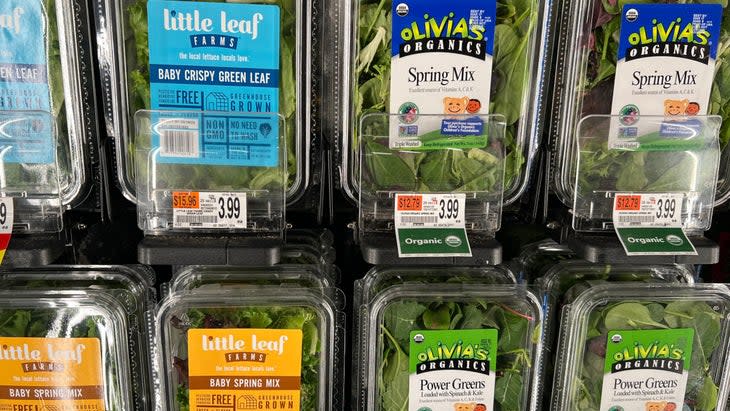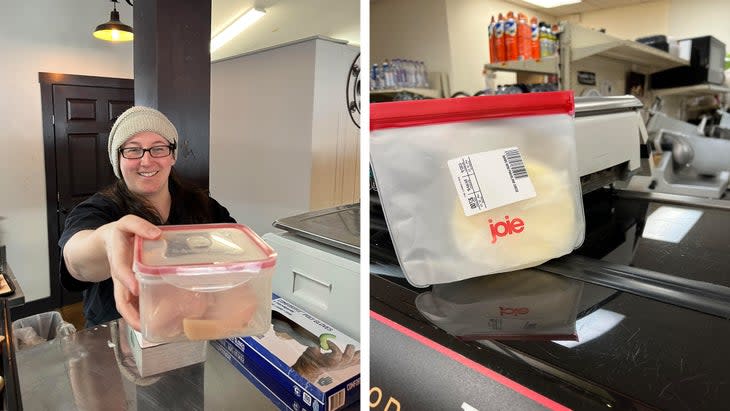Go Gentler on the Planet with These Grocery Store Swap-Outs
This article originally appeared on Outside
Doing right by the planet can make you happier, healthier, and--yes--wealthier. Outside's Head of Sustainability, Kristin Hostetter, explores small lifestyle tweaks that can make a big impact. Write to her at climateneutral-ish@outsideinc.com.
Confession: I love bougie lettuce. You know, the stuff that comes in plastic clamshell packaging, costs about 20 cents per leaf, and always has the words "organic" and "baby" on the label. I'd eat a pile with every meal if I could, dressed in a squeeze of lemon and a little olive oil.
But the packaging kills me. I feel pangs of guilt every time I toss one in my grocery cart, knowing that I'm supporting a company who uses plastic packaging and that plastic recycling rates in the U.S. are only around 6 percent.

Oftentimes, though, to make up for my fancy lettuce habit, I choose more humble, naked greens-like the bland head of red leaf or green leaf lettuce or a head of cabbage dressed up with some chopped herbs or kale.
It got me thinking about all the choices I make in the grocery store and the packaging of every item I place on the check-out conveyor belt. As someone who's trying to live more sustainably, should I buy my ancho chili powder in a plastic bottle or a glass one?
Like most things in the world, the devil is in the details.
"Less packaging is always better for the planet," says Cory Connors, host of Sustainable Packaging Podcast. "By choosing products that are package-free or sustainably packaged, you're voting with your wallet and telling companies that you won't buy stuff that's excessively or irresponsibly packaged."
But it's over-simplistic to think that all packaging is evil. "There's nothing sustainable about rotten or damaged food," says Connors. "If a company has to package something in a multilayered plastic container in order to get it to the consumer in an edible state, that's more sustainable than not using packaging if it results in rotten, unusable food."
"We can all be part of the solution when it comes to sustainable packaging," says Connors. "The key, says Connors, is to only buy products that are packaged in material that you are certain that you can recycle in your community or, better yet, that you re-use indefinitely, like glass jars. Confirm with your local material recycling facility (also known as a MRF, which rhymes with surf) what is actually getting recycled. Then share what you know in your community."
Connors is encouraged by systemic shifts he's seeing, like more stores adopting drop-off recycling centers and communities expanding recycling services to accommodate things like soft plastics and textiles.
In the average grocery store today, we're faced with choices on literally every shelf, so Connors and I took a virtual stroll, aisle by aisle, to talk about the most sustainable choices we can make at the grocery store.
Fresh and Refrigerated Stuff
1. In the produce department, skip the plastic produce bags. Just wash those fruits and veggies.
2. Buy loose carrots, potatoes, and onions, rather than the pre-bagged options.
3. Choose cardboard egg cartons, not plastic or styrofoam. You can put them in the recycle bin or repurpose them as seed starters for the garden or DIY fire starters with melted candle scraps and sawdust or dryer lint. Egg cartons also make a great substitute for packing peanuts or you can tear them up and add them to the compost heap.

4. If you're stopping by the deli counter, bring your own containers, and skip the plastic bags and cups. "It takes guts to bring your own packaging into a typical store," says Connors. I can attest to this. Most deli workers raise their eyebrows when I ask them to put the sliced provolone in my silicone bag, but they do it. "Ten years ago people, it was radical to bring your own reusable grocery bags to the store," says Connors. "But now it's commonplace, thanks to bag bans and bag taxes. Maybe the same will be true for deli bags and containers in the future."

5. If you're buying a cut of meat that is sold both at the butcher counter and in prepackaged portions, opt for the former. You can use the strategy listed above--bring your own re-usable containers. Note that if your purchase comes wrapped in butcher paper with a plastic coating, that won't be recyclable. Be brave! If someone questions you, take the opportunity to tell them that you’re trying to avoid single-use plastic packaging.
6. Avoid black plastic (often found in the prepackaged meat department) trays at all costs. They are not recyclable. Anywhere. Putting it in your bin is wishcycling.
Dry Goods
7. If your store has a bulk aisle, shop there for staples like rice, grains, nuts, and pasta. Bring your own containers!
8. "When we think about things like spices, sauces, and condiments, whatever container you will wash and reuse when it's empty has the lower carbon footprint," says Connors. "If you reuse glass bottles, for instance, that's the best choice. If you don’t plan on reusing the container, just be sure that whatever you buy is recyclable where you live."
9. Kick the bottled water habit. Just do it. In the U.S., we're fortunate to have perfectly drinkable tap water just about everywhere. Invest in a good water bottle and refill it often.
10. Wean yourself off plastic wrap. I was hooked for many years, but I kicked the habit when I realized that my roll of plastic is nice to have, but not a need. Now, when I really need to wrap something, I opt for tin foil, which is recyclable as long as it's clean. Just collect it in a ball until you have one that's about three inches in diameter so it will get sorted properly in the recycling center and not fall through the cracks of the machinery.
11. Instead of liquid or plastic pod-encased dishwasher soap, buy the powder in cardboard boxes (Cascade is a classic, old school option that works great). "All liquid cleaners are 90 percent water," says Connors. "Buying water-based products for use in a room that produces water (like the kitchen, bathroom, or laundry room) is pretty silly. Especially because there are so many powdered and concentrated cleaners available today. And the carbon footprint of concentrates is so much lower, because it requires less packaging and is lighter and smaller to ship and transport."
12. Order laundry strips or pressed powder tablets to avoid the pods (they're wrapped in plastic that becomes microplastic when it dissolves) and the big plastic jugs. I love Tru Earth. The strips work great, smell nice (unscented is also an option), and take up a fraction of the space in my laundry room.
13. Skip the dryer sheets (which are made from single-use plastic in the form of polyester) and opt for dryer balls. They last for more than 1,000 loads, so you'll save money, too. I use Tru Earth Wool Dryer Balls and love them.
14. Stop wasting money on zipperlock bags. Even if you wash and reuse them, eventually they give out. Not so with my new favorite bags by Joie. I love these supple silicone pouches, which come in a variety of sizes, are easy to clean, easy to seal (some silicone bags are stiff and fussy) and freezer safe.
Personal Care
15. Skip the plastic shampoo bottles and discover the wonder of shampoo bars. They do a fantastic job and last forever as long as you don't let them sit in a puddle of water. They're great for travel, too, which means you can reject the little plastic bottles in your hotel room.

16. And say goodbye to plastic conditioner bottles full of watered down product, too. After trying a slew of conditioner bars that leave my long hair feeling dry, waxy, and tangly, I finally found one by Dip that kicks ass.
One last thing: If you're frustrated by the excessive plastic packaging at your local grocery, write a letter and tell them so! I used this handy template from nonprofit Beyond Plastics, and about a week later received a phone call from the store manager. We had a meaningful discussion, and while he defended the need to package bulk-bought spinach in clamshell plastic packaging, he listened, and conceded that there are some items in the store that could do with less packaging, and promised to look into it.
Kristin Hostetter is the Head of Sustainability at Outside Interactive, Inc. and the resident sustainability columnist on Outside Online.
For exclusive access to all of our fitness, gear, adventure, and travel stories, plus discounts on trips, events, and gear, sign up for Outside+ today.

